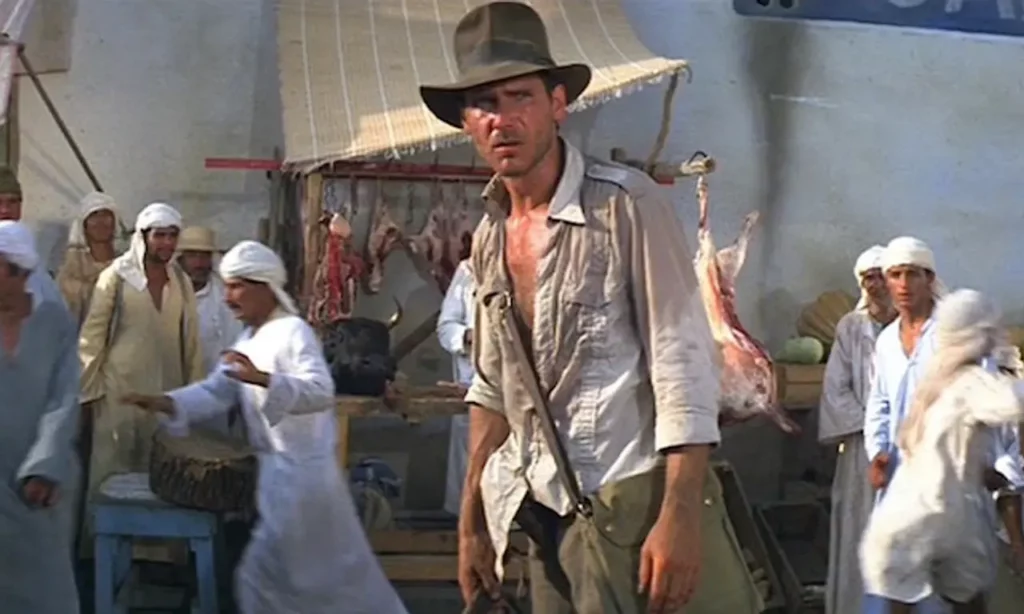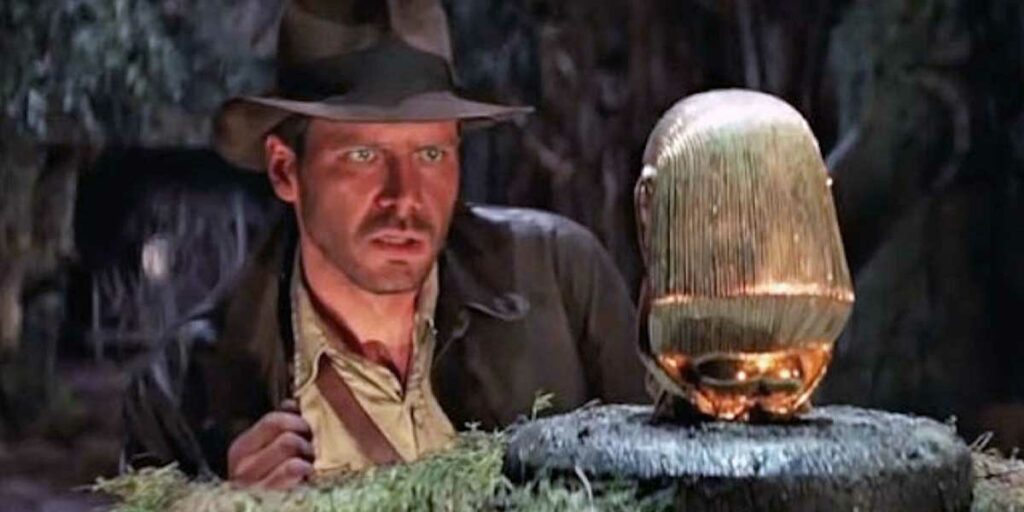Cementing Steven Spielberg’s place as the greatest blockbuster director ever, Raiders of the Lost Ark well deserves its spot as the jewel of action cinema.
In hindsight, Indiana Jones (Harrison Ford) is a pretty terrible archaeologist. The first we ever see of him is a failed mission, his iconic quest for the golden idol in the jungles of South America foiled by an arch-rival who remembered to ask the native population for help. However, a request from the US military that refers to the fabled Ark of the Covenant is more than enough to get the explorer back into the field, a desperate spark for glory re-ignited, and he sets off on one of cinema’s great jet-setting quests. From Nepal to Egypt to a secret U-boat base off the coast of Greece, Jones spends the remainder of Raiders of the Lost Ark battling against all manner of evil forces determined to keep him from getting his hands on the Ark, from Nazis in planes to Nazis in trucks, a temple full of skeletons to a temple full of deadly cobras.
Not that there’s too much point to recounting the story of Raiders of the Lost Ark, however; it is as famous and easily recitable today as it likely was predictable to its original theatre-going audience back in the 1980s. Such is the consequence of Steven Spielberg and George Lucas’ attempt to modernise and pay homage to the weekly serial movies of the early 20th century, where the plot serves as an escapist mechanism to allow filmmakers to hurtle from set piece to set piece, with audiences safe in the knowledge that the Nazis will be vanquished, the day will be saved and the hero will get the girl. The characters and storylines need be no deeper or more complex than what is required to facilitate the entertainment. With all that said, Raiders of the Lost Ark is more than entertaining enough for anyone to care.
In no other movie, perhaps, is Spielberg’s aptitude for allowing his direction to remain almost invisible more effectively realised. Raiders of the Lost Ark still plays out as if it had nobody behind the camera at all; when the audience doesn’t pay incredibly close attention to the camera angles, the editing or compositions of each shot, it all rolls smoothly together into one of the most innately comprehensible and, for want of a better word, ‘watchable’ movies ever committed to film. Spielberg, here, proves himself as the director most fluent in the visual language of American cinema. Raiders of the Lost Ark pastiches every milestone from Citizen Kane to Lawrence of Arabia and back, operates at a staggering level of density, both visually and story-wise, yet is so accessible, played with virtuosic talent, in a language comprehended fluently by as many audience members as possible.

Spielberg’s dynamism here also allows significant freedom in exactly how Raiders of the Lost Ark’s story beats play out on the screen. Remarkably few shortcuts are taken here; narrative devices or pieces of expositional dialogue that serve no purpose other than to further the story are, frankly, few and far between. The film seems to adhere to a maxim of never telling what could be shown, an ideal that adventure movies in the present day have fallen out of love with. This helps to produce some of the movie’s most enduring moments – why say out loud that Jones prepares a little haphazardly when he can throw a revolver on top of his luggage before he shuts the suitcase? Why have Jones explain his attachment to his equipment when you can have him reach frantically under a trap door for his whip?
Considering the decades since its release, and the fact that it was made with one foot firmly stuck in the past, Raiders of the Lost Ark still manages to feel remarkably modern. Its irrepressible momentum translates wonderfully across to audiences who may the slow pace of a more dated thriller a touch unpalatable, and it is perhaps its existence in a time separate to the era of its release that keeps it preserved through to the modern day, as that nostalgia has transmitted away from the objects of Raiders of the Lost Ark’s reverence onto the film itself. As with all box office powerhouses of the last century, it has been somewhat cursed with the never-fully-complimentary sociological cross-examination, but its legacy has largely remained intact – its dominating themes of anti-fascism and a fight back against the tenets of National Socialism are an awful lot easier to herald today than the somewhat questionable portrayals in Temple of Doom, and its frequent willingness to stereotype becomes a little easier to tolerate when it does so to every single character in the movie, especially the Americans.
Raiders of the Lost Ark’s most damaging legacy may in fact be felt by the field of archaeology, whose practitioners have long decried the franchise as setting an awfully bad example for what the discipline entails. Perhaps this is because there would be very little hope for a successfully duty-bound researcher to have quite as much fun as this on screen. It’s little wonder that Raiders of the Lost Ark remains one of the high watermarks of the American cinematic canon, progenitor of one of the most profitable film franchises of all time, and the bedrock on which Harrison Ford builds his case as perhaps the industry’s greatest ever action star. Raiders of the Lost Ark, perhaps above all else, marks the greatest example of a director establishing and revelling in their element. Spielberg is the greatest blockbuster director in Hollywood history to date; let this movie stand as one of the brightest jewels in that crown.
WATCH RAIDERS OF THE LOST ARK:
Raiders of the Lost Ark was released on June 12, 1981, and is now available to watch on Digital, DVD & Blu-Ray. Read our ranking of all the Indiana Jones films.

